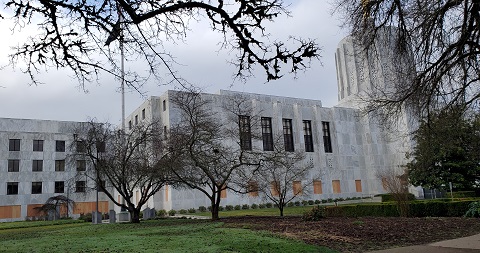A ton of bills are about to die.
This week the Oregon Legislature will reach checkpoint #1 in its path to
sine die -- the Constitutional end of session on June 28. March 19th marks the day when bills need to be scheduled for a work session in the Chamber of Origin. House bills need to have a hearing and work session scheduled by a committee of the House, and in the Senate, it is the same. If this fails to happen, the bill is effectively dead for the session. The only committees without this deadline are Rules, Revenue, Ways and Means and other Joint Committees. Bills assigned to those committees remain in play until the final days of the Legislative Session.
With hundreds of bills assigned to the various committees and many of them yet to be heard, it is expected that committee agendas will become a bit more packed between March 19th and April 13th. April 13th is checkpoint #2 where bills must have received a vote on the original chamber floor, or they are dead for the session.
Already this week, hearing agendas are packed with bills. Some of the bills have already had public hearing and are headed to work sessions, others are simply getting started. What is certain is that this is a week full of bills that affect every Oregonian. Here are a few examples of bills that are starting the hearing process. Other bills can be found on the
legislative website.
Monday:
- House Committee on Early Childhood (1:00pm) - HB 2474 -Expands Oregon Family Medical Leave Act (OFLA) to include employers with 1 or more employees. Previously it was employers with 25 employees or more. OFLA allows for up to 12 weeks of leave for certain situations such as the birth or adoption of a child.
- House Committee on Energy and Environment (1:00pm) – There will be information provided by several groups and state agencies around clean energy just prior to the introduction of HB 2021 with the -1 amendments which are a “gut and stuff†to the bill, but they are yet to be posted for public review.
Tuesday:
- House Committee on Housing (8:00am) - HB 2364 – requires rental property owners to notify tenants when they are going to sell the rental property and allow them first right to purchase the property. There is also HB2580 which limits rent increases if you are the purchaser of a rental property with tenants already occupying it.
- Joint Committee on Transportation (1:00pm) – HB 3065 - Directs Department of Transportation to study development of uniform standards for speed bump height. However, it is simply a place holder bill for all things transportation related. The -5 amendments will add tolls and congestion pricing to the legislation.
Wednesday:
- House Committee on Business and Labor (3:15pm) – HB 2813 – is centered around outdoor workers and air quality. It is similar to HB2588 (not yet scheduled) but goes a few steps further. It requires employers with 20 or more employees to measure the air particles during the workday and take action by either providing the appropriate respirators to employees or suspending work till the air quality is acceptable.
- Senate Committee on Education (3:15pm) – SB 223 – This bill states that private schools will register with the Oregon Department of Education (ODE) annually, and that ODE will create an advisory committee to oversee Oregon’s private schools.
Thursday:
- Senate Committee on Rules (1:00pm) – There will be a series of hearings regarding the Oregon Legislature and the behavior of legislators. SB 261 – says that a legislator may not use funds from a solicitation or other contributions to pay legal expenses. SB 262 says that if a legislator is absent without permission during session, they may not receive their daily per diem and shall be fined $500 per day. SJR3 says that if a member of the legislature is absent for more than 10 days they are deemed to be engaging in disorderly behavior and this disqualifies them from holding office. SJR 4 would propose a constitutional amendment to the voters to change the definition of quorum to a simple majority.
- House Committee on General Government (3:15pm) – Will hear a bill relating to the processing of cannabis, restricting its location, and requiring a fire safety plan on file with the local fire department.
If you are interested in testifying for or against a bill, it is not that hard to do. However, this can
only be done when a bill is scheduled for a public hearing. Also, keep in mind that this session there have been multiple occasions where bills were scheduled for a hearing but due to the volume of people wanting to speak, they only got to 20-40% of those that signed up. Just because you ask to be heard does not mean you will be. Therefore, it is important to have you talking points ready for a 1–2-minute window of time
and submit written testimony as well.
Use the
OLIS system to do both. Once you locate your bill and the hearing, scroll to the bottom of the agenda for instructions: you will see links where you can submit written testimony on a bill or topic scheduled for a public hearing. You can sign up to testify live.
--Terese Humboldt| Post Date: 2021-03-15 07:48:02 | Last Update: 2021-03-15 08:09:20 |






